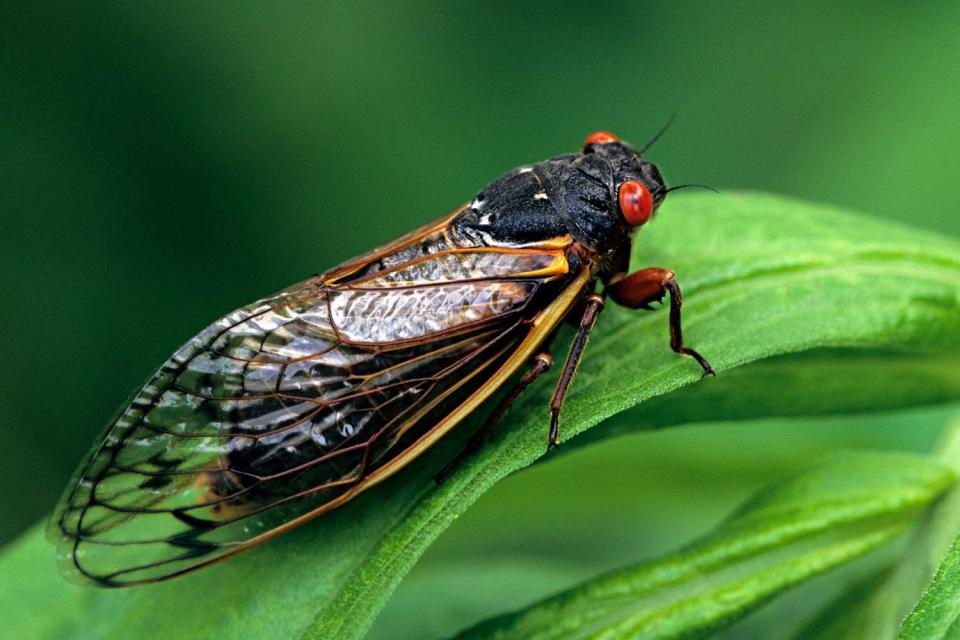Two Cicada Broods Are Emerging at Once and They 'Will Pee in Jets' on Everything, Study Finds
Cicadas, like many mammals and unlike other bugs, urinate in a steady stream

Getty
A periodical cicadaTwo cicada broods are expected to emerge in Spring 2024 in the United States
A new study exploring the bug's ability to excrete fluid found that cicadas are capable of urinating in a steady stream
The behavior is unusual for a bug and is usually only seen in larger mammals, according to the study
It's not only noise that periodical cicadas will bring as the weather gets warmer.
According to a study published Monday in Proceedings of the National Academy of Sciences (PNAS) titled "Unifying Fluidic Excretion Across Life from Cicadas to Elephants," cicadas have been found to "possess the capability for jetting fluids through remarkably small orifices" — meaning the bugs can urinate in a single mighty stream.
The study adds that "current fluid urination models, predominantly formulated for mammals, suggest that jetting is confined to animals over 3 kg." So, the two-kilogram cicada's observed "capability for jetting fluid" like larger mammals is surprising and challenges what scientists know about "ecology, evolutionary biology, and biofluid dynamics." It also means Americans may see plenty of powerful pee streams come spring.
Beginning in April, two different broods of periodical cicadas — Brood XIX, which emerges every 13 years across the southeastern United States, and Brood XIII, which emerges through Illinois every 17 years — will emerge in the same season and overlap in Illinois for the first time in 221 years.
Related: Taylor Swift Says She 'Swallowed a Bug' by Accident During Chicago Eras Tour Show: 'Delicious'
The study exploring the powerful urination of cicadas found that where other insects eat tree sap at a rate and frequency that only produces droplets of urination, cicadas consume tree sap at a rate at which it would be more physically taxing on them to have to rid themselves of each urine droplet individually.
Bioengineer and biophysicist Elio Challita, who co-authored the study, spoke with PopSci about the unique phenomenon, saying, "The biggest surprise was discovering that cicadas can pee in jets, despite being small insects with energetic constraints due to their nutrient-deficient diet."

Getty
A 17-year cicada photographed in western North Carolina"This goes against the conventional wisdom that small animals, especially those under one kilogram [2.2. pounds], cannot pee in jets," Challita added to the outlet.
"Cicada urination stays in quite a unique region in fluid dynamics, where both inertia and capillary forces play significant roles simultaneously over gravity," Sunghwan Jung, a biological and environmental engineer at Cornell, told The New York Times.
Never miss a story — sign up for PEOPLE's free daily newsletter to stay up-to-date on the best of what PEOPLE has to offer, from juicy celebrity news to compelling human interest stories.
Given the newness of the data regarding cicada urination, it is currently unknown what role it will play in the double cicada emergence set for the U.S. this spring. However, Challita speculated to PopSci that it could be substantial.
"Cicadas will be emerging in the billions this year, so expect a lot of peeing! More importantly, we don't understand the ecological implications for the surrounding flora and fauna," the bioengineer continued.
Challita noted, "By investigating these processes, we can uncover fascinating adaptations and gain insights into how animals interact with their environment. It's also a reminder that there's still so much to discover about the natural world, even in the most unexpected places, like cicada pee!"
For more People news, make sure to sign up for our newsletter!
Read the original article on People.


